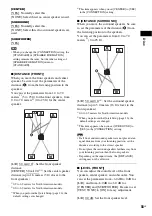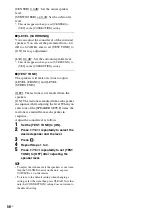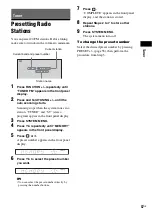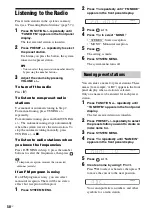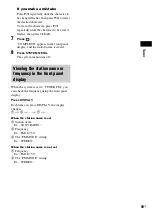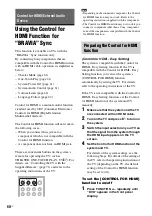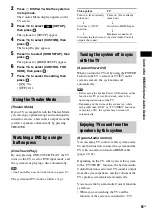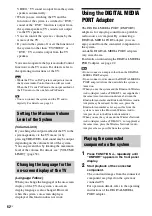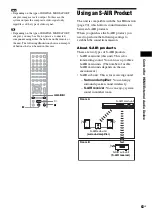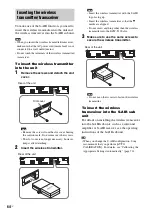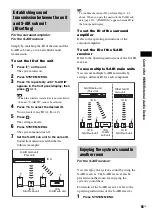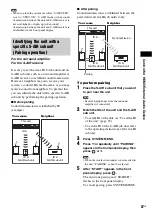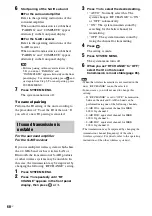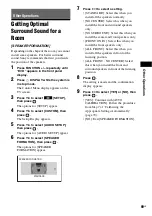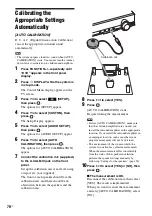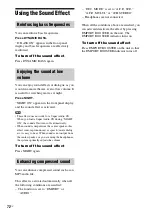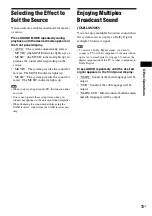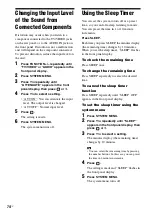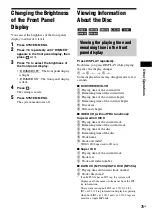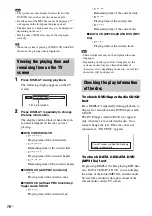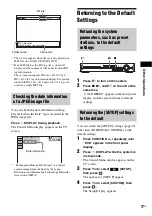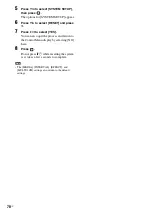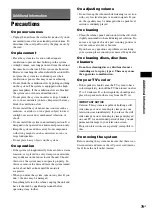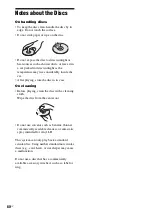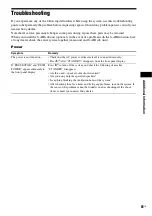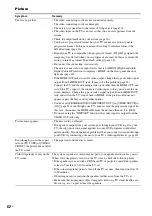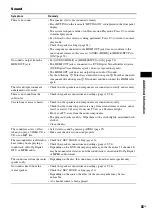
68
US
6
Start pairing of the S-AIR sub unit.
x
For the surround amplifier
Refer to the operating instructions of the
surround amplifier.
When sound transmission is established,
“PAIRING” and “COMPLETE” appear
alternately in the front panel display.
x
For the S-AIR receiver
Refer to the operating instructions of the
S-AIR receiver.
When sound transmission is established,
“PAIRING” and “COMPLETE” appear
alternately in the front panel display.
Note
• Perform pairing within several minutes of Step
5. If you do not, “PAIRING” and
“INCOMPLETE” appear alternately in the front
panel display. To continue pairing, press
and
start again from Step 5. To cancel pairing, press
SYSTEM MENU.
7
Press SYSTEM MENU.
The system menu turns off.
To cancel pairing
Perform the ID setting of the unit according to
the procedure of “To set the ID of the unit.” If
you select a new ID, pairing is canceled.
If you use multiple wireless systems which share
the 2.4 GHz band, such as wireless LAN or
Bluetooth, the transmission of S-AIR products
or other wireless systems may be unstable. In
this case, the transmission may be improved by
changing the following “RF CHANGE” setting.
1
Press SYSTEM MENU.
2
Press
X
/
x
repeatedly until “RF
CHANGE” appears in the front panel
display, then press
or
c
.
3
Press
X
/
x
to select the desired setting.
• “AUTO”: Normally select this. The
system changes “RF CHANGE” to “ON”
or “OFF” automatically.
• “ON”: The system transmits sound by
searching for the better channel for
transmitting.
• “OFF”: The system transmits sound by
fixing the channel for transmitting.
4
Press .
The setting is made.
5
Press SYSTEM MENU.
The system menu turns off.
6
When you set “RF CHANGE” to “OFF,”
select the ID so that sound
transmission is most stable (page 65).
Note
• When the wireless transmitter is not inserted in the
unit, “RF CHANGE” cannot be selected.
• In most cases, you will not need to change this
setting.
– If “RF CHANGE” is set to “OFF,” transmission
between the unit and S-AIR sub unit can be
performed using one of the following channels.
– S-AIR ID A: equivalent channel for IEEE
802.11b/g channel 1
– S-AIR ID B: equivalent channel for IEEE
802.11b/g channel 6
– S-AIR ID C: equivalent channel for IEEE
802.11b/g channel 11
• The transmission may be improved by changing the
transmission channel (frequency) of the other
wireless system(s). For details, refer to the operating
instructions of the other wireless system(s).
If sound transmission is
unstable
For the surround amplifier
For the S-AIR receiver


